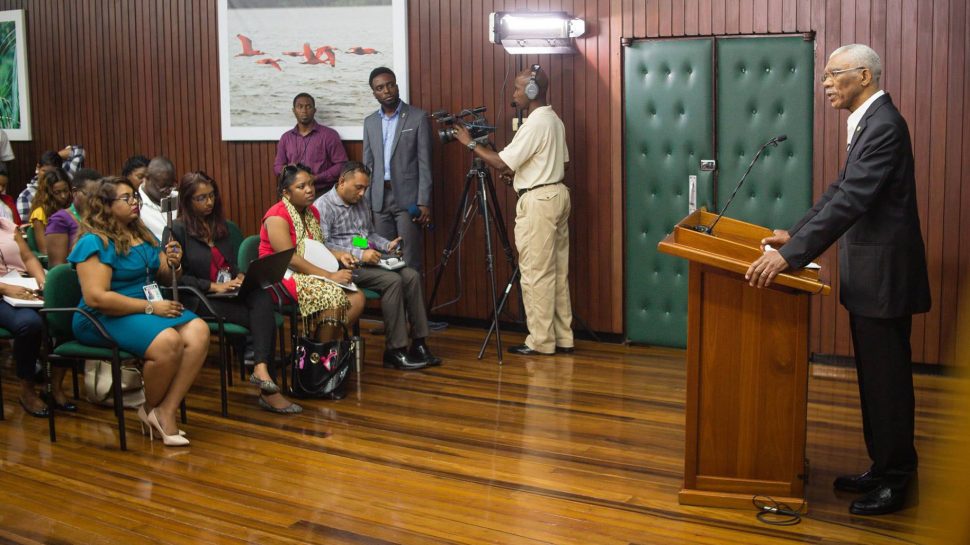President David Granger yesterday said that the report from the High Level Task Force, which he helped set up last year to resolve the impasse between his administration and the Guyana Teachers’ Union (GTU) over wages and non-salary benefits, was found to be “deficient” by Cabinet and negotiations must go back to the drawing board.
“The existing report should not be regarded as a sound basis for proceeding because critical information was not supplied to the committee,” Granger told reporters at the Ministry of the Presidency, where he held his third press conference with the local media since taking office in 2015.
After six months of negotiations, the Task Force had agreed to grant teachers a 40% increase on 2015 salaries and a 5% increase thereafter for 2017 to 2020, among other benefits. Government has, however, told teachers that it can offer only $700 million for increases in the 2018 fiscal year, a sum which amounts to little more than a 5% increase. While imposing increases in the absence of collective bargaining in recent years, the current government has said it was doing so without prejudice to the ongoing negotiations with unions.
With a strike by teachers expected to continue when the new school term begins next Monday, Granger yesterday said government is actively searching for fresh sources of funding to satisfy the teachers’ demands for salary increases.
The president explained that the Ministry of Social Protection, which has responsibility for labour and industrial relations, is in touch with the Ministry of Finance to see if additional funds can be found from other areas of government expenditure in order to provide sufficient funds to the teachers. “We had to do this in the case of Guyana Sugar Corporation workers in which all ministries volunteered to surrender funds which had been allocated for other purposes and this is what is being attempted at present,” he explained, while referring to mobilising funds to make severance paymeents to laid-off sugar workers.
However, Granger maintained that his government is negotiating an agreement for 2018, rather than a multi-year agreement as was believed by the GTU. The union has been engaged in negotiations for two-and-a-half years with the aim of security a multi-year agreement, effective from 2016 to 2020.
At no point during the process were teachers informed that government was not willing to negotiate a multi-year agreement, which had become the norm under the previous administration.
When asked by Stabroek News why government’s responses to GTU’s requests only covered the academic and fiscal year of 2018, Granger said that government is focused on getting teachers back into the classroom.
“The immediate need is to conclude an agreement which will see teachers calling off the strike and entering into long term negotiations for that multi-year agreement. We have not embarked on multi-year negotiations. It is desirable but right now we are preoccupied with day-to-day issues. It is desirable to have a multi-year agreement but this is not the time,” he said.
GTU President Mark Lyte was ambivalent about Granger’s statements. “It’s good that the president has spoken on this issue and we hope they find the money,” he said.
But Lyte maintained that his union has been negotiating a multi-year agreement and was confused about the president’s declaration that government was not doing the same. “The GTU Executive will have to return to its General Council with this information and work from the position they dictate,” he said.
Despite these incongruities, President Granger maintained that the teachers’ strike is premature. “We feel that a strike is an extreme measure which should only be applied as a last resort. Before we reach to the stage of a strike, there should be some form of mediation and if mediation fails we can go to arbitration. It is premature to speak of a strike at this stage and we are still on the government side aiming at mediation. I do not believe that mediation has failed,” Granger said yesterday, which was day five of the nationwide pre-term strike.
Granger also said he felt “satisfied” with government’s performance on industrial relations, while noting that budgetary actions and the work of the Department of Labour have kept a reasonably stable industrial relations environment. “The success of the department has to be measured in the fact that we have not had a major disturbance,” the president stressed.










